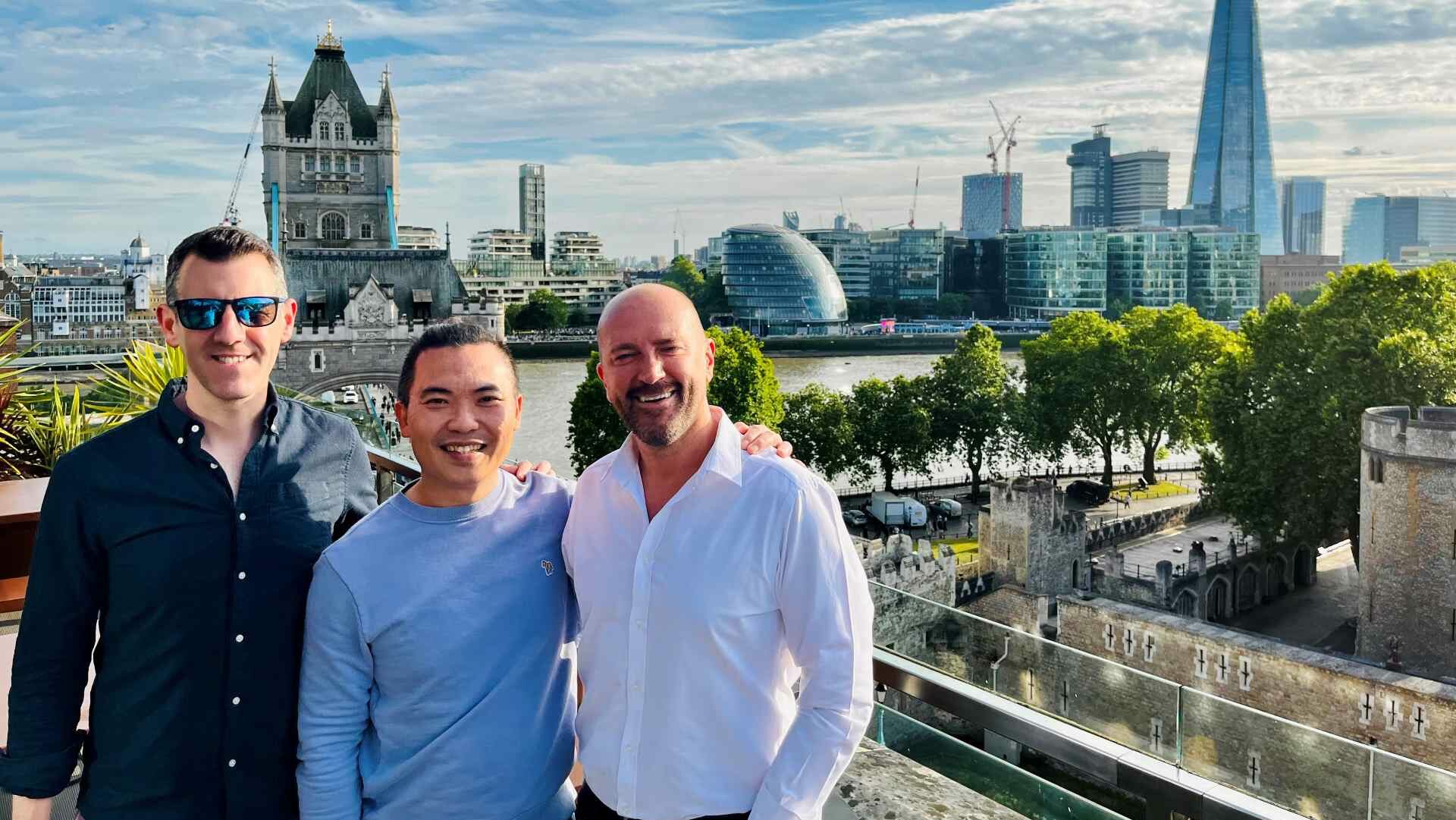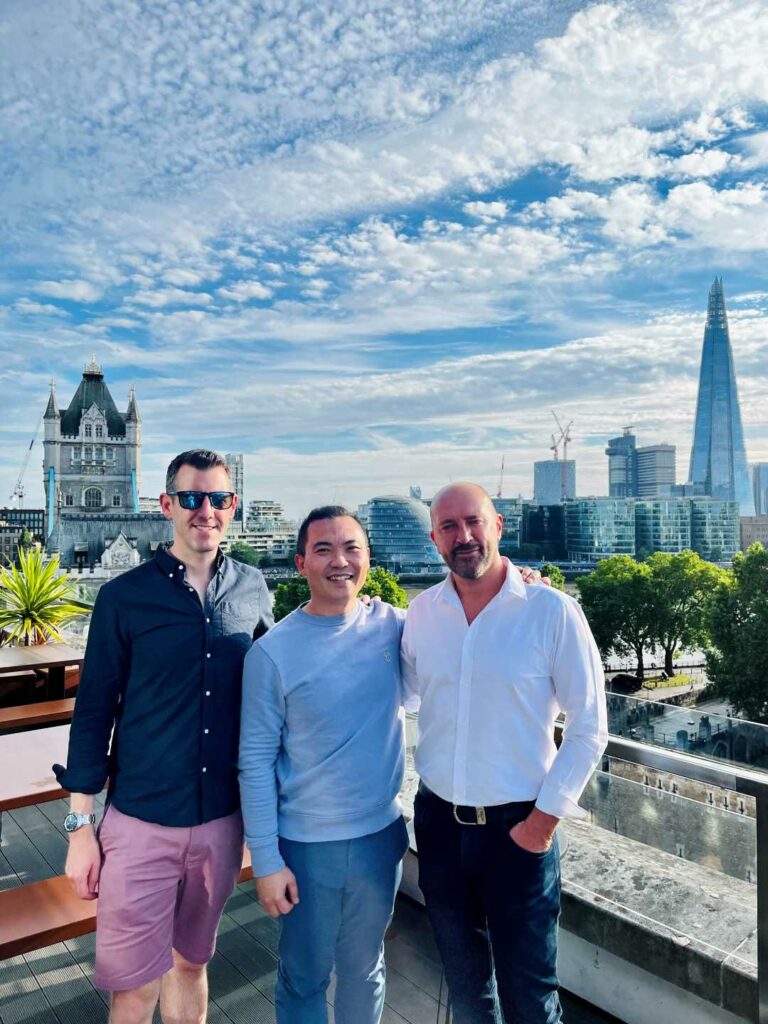Organon Pride Network leaders share insights on ERG leadership and workplace inclusion
In partnership with myGwork

Andrew Brown, David Burten and Edison Chen have all led the Organon Pride network at some point during their career at the company. Here, they share their unique perspectives as leaders of an ERG, how leadership skills must develop in an increasingly diverse business landscape, and what the future of Pride in the workplace could look like.
Could you introduce yourself and your current role at Organon?
David Burten: My name is David Burten (he/him); I’m the global continuous improvement lead for Organon, based in the UK, and I’m also co-lead of the Organon Pride Network.
Andrew Brown: I’m Andrew Brown (he/him); I’ve worked for Organon since its inception and the legacy company that it was formed from. I’m currently a product release coordinator, and I founded the LGBTQ+ network three years ago for Organon and recently handed it over to David and Edison.
Edison Chen: I’m Edison Chen (he/him), and my role is global commercial capability lead. I work in commercial, supporting the commercial operations including learning and development, and have been with the company for seven years.
What do you believe makes an effective leader of an ERG?
Edison: Apart from the basics of strong communicator, leadership skills and understanding diversity and inclusion – I believe what makes an effective ERG leader is the ability to be thoughtful yet strategic, advocate and influence change that meets the interests of the ERG community and influencing company policies and practices. All ERG leaders, including the three of us, are working voluntarily on top of our day job. They must have the skills to prioritise, organise and network effectively, to be a completely effective leader.
Andrew: I think you need the passion to make a difference, to value diversity, equity and inclusion of the communities that you’re from. I find that it is important for leaders of an ERG to be part of the community as they bring a unique perspective that is critical to it. You also need to appreciate the paradox of how being different doesn’t matter, but it does matter! You can pick up leadership and other business skills as you go along the ERG leadership journey, but if you don’t have the passion to make a difference in the beginning, then really, what’s your drive for being in that role?
David: You must be sensitive to the situations you are faced with, sincere in your interactions and have a desire to make a positive impact. You must be able to connect with people who have different experiences, different backgrounds, different cultures – there is a lot of representation that we need to cover. You also must be willing to challenge senior leaders when needed, including getting access to time and money to have that meaningful impact.
Throughout your careers, have you noticed any developments in attitudes towards the importance of diversity and inclusion?
Andrew: In the early days of my career, I was a victim of homophobia in the language and behavior from people working next to me through to senior managers. As I began to see people in the business be more confident in being who they are through, particular in the younger generations, you then begin to see people stand up for themselves and who the groups they belong to. If you can see other people who are similar to you behaving in a certain way, you think okay, they’re safe doing that, I’m going to join them and speak up for myself too. Since becoming an ERG lead, I’ve worked more closely with our Belonging team and other inclusioneers and become more switched on and aware of what is going on in our business and other companies. I see and firmly believe that Organon are committed to their DEI statements – Organon wants equity for everyone and wants you to feel like you belong at the company, regardless of the characteristics that make you who you are. And if you don’t feel safe here, we have policies, guidelines and of course our ERGs to help to address that.

David: I’ve worked for five different organisations in the last 18 years, and I’ve seen a huge variation. When I first started my career, I wouldn’t dare to come out. It was simply not a safe space for LGBTQ+ employees to be themselves. When I came out later, it went okay, but I was the only ‘out’ employee on a site with 400 people and I received a lot of comments and jokes. Compare that to today at Organon, who fully embraced the ERGs and created the safe space to have a network in place and have policies and procedures to support employee development. Thankfully, there has been a huge shift, and in Organon many people also practice inclusive language when interacting with new employees (e.g. ‘Do you have a partner?’ instead of ‘Do you have a wife?’), but there’s still a long way to go. Looking across the globe you can see just how much variation we have in inclusivity today, even within one company.
Edison: We are very fortunate that Organon embraces the strategy of diversity, equity, inclusion and belonging. “We all belong” is a big part of our company culture. But let’s not forget that there is still work to be done so that our community has a voice they deserve. We must find creative ways to do things differently and explore ideas to try and engage with those communities so we can protect their safety, but also to offer help.
What does the future of Organon Pride look like – what’s the next focus?
Andrew: I’d like to see more diversity across leadership teams – at Organon our ERG Global lead roles are rotated every two years – so that helps to change perspectives and increase opportunities for diversity. We also mentioned that these are volunteer roles, so I would like to see more commitment from companies in general to enable people to get more involved in ERGs and not have to find time to fit it into a ‘day job’. This will encourage more active engagement and make running these groups much, much more effective.
Edison: I have had a few conversations now with ERGs looking specifically at intersectionality. How do we reach employees beyond our own membership? How do we drive new membership to our Pride network, enabling more education around allyship? Thanks to all the work that Andrew, David and other pride leaders have contributed, we recently launched a global transgender guideline, as we truly believe in creating inclusive policies that are positive for everyone. We want to be seen as a progressive and equitable company, but it’s work in progress. We are constantly evolving and learning as we go.
David: The main thing is to continue pushing to make sure that we are a safe space for everyone under the LGBTQ+ spectrum, to make sure it’s not just the policies and procedures in place to support them, but also open dialogue and conversation to raise awareness and educate. It’s about continually pushing the boundaries to create safety and improve inclusivity.
Organon is a proud partner of myGwork, the LGBTQ+ business community. Find out more about LGBTQ+-friendly job opportunities at Organon.
